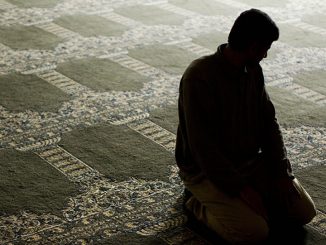
The Blessed Night and Etikaf
To arrange for search and welcome of the Blessed Night (Lailat-ul Qadr) is the
seventh important thing to do in Ramadhan.
It is this night that #Qur’an was revealed. This night is better than thousands of
months – with regard to its value and greatness, with regard to the task carried out
in it, with regard to the bounties and rewards that are distributed, and could be
won, in it. A person who stays awake during this night for prayers and #supplication
has been given the glad tidings of forgiveness from all his sins. Like any other night,
there comes a time in this night too when #supplications are accepted and
whatever is asked for, in terms of #goodness in this life and the Hereafter, is
granted.37 Conversely, there can be no bigger misery than remaining devoid of
goodness in spite of the descent of this blessed night.38
While we have not been told which of the Ramadhan nights is the Blessed Night,
Hadith informs us that it is any of the odd-numbered nights of the last decade of
Ramadhan – any of the 21st, 23rd, 25th, 27th, and 29th. Other #Hadith do not go this
further in detail and just say that this night is one of the nights during the last
decade or during the whole month of #Ramadhan.
It is generally held that 27th night of #Ramadhan is that Blessed #Night, that it is
enough if we stay awake for prayers and #supplications in it. While it is true that
narration of some Companions (may #Allah be pleased with them) and other tall
figures of #Islam make the 27th night more probable, there appears to be a great
#wisdom, to me, in not revealing the exact date for the blessed night. If it had been
specified as, say, 27th, then this wisdom would be lost.
The secret of keeping it concealed is that you remain engaged in its search, work
hard towards its pursuit, and keep the flame of devotion ablaze – search it in the
odd-numbered nights during the last decade; if you are more willing and keen in
the search, seek it in every night of that decade; if you are simply devoted to the
task, go in search for it throughout #Ramadhan. What is most pleasing to Allah is
that His servant (Abd) should engage himself in untiring effort to please his Lord, to
seek His mercy and bounties. More than the work accomplished, it is the
‘intention,’ resolve and continuous struggle that is required of a true believer. If
the night were specified, the very beauty of struggle and effort would be gone.
Staying awake for prayers in this night would get you all the benefits of doing so in
any other night, but, more and above that, there will be manifold increase in
reward and opening up the floodgates of additional mercy, bounty and generosity.
The whole of #Ramadhan is a sign of Allah’s special favour on this #Ummah, in that
He has set for us great rewards for less time and effort, which earlier nations could
get with great effort spanned over a long time. According to a saying of the
#Prophet (pbuh), it is as if #Muslims get more recompense for their work from Asr
(afternoon) to #Maghrib (evening), than that which Jews would get for their work
from #Fajr (dawn) to #Zuhr (noon) or #Christians’ from Zuhr (noon) to Maghrib
(evening).39 The Blessed #Night is the biggest of all these signs.
So, get ready! Make a resolve that you would devote at least the five odd numbered
nights of the last decade for the search of the Blessed Night by keeping
awake for prayers, supplications, and recitation of #Qur’an. If it is not possible to
devote the whole night, then do earmark a couple of hours in the last half of the
night. Keep standing in prayers and recite from Qur’an as much as you can,
prostrate long, be repentant for your sins, weep and wail, and seek forgiveness
from #Allah.
The time of acceptance of supplications comes during every night, but its
occurrence during the Blessed Night adds to beauty and power. Since no one is
sure about this time, the Holy #Prophet (pbuh) taught a very comprehensive Dua to
his wife A’isha (may #Allah be please with her) for this purpose, and we too should
verbalise it through the night: ‘Allah.umma innaka afu.wun tuhib.ul afwa fa.fu anni’
(O Allah, You are very forgiving and like to forgive, so please forgive me!)
If you have the strength and resolve, then do observe Etikaf (spending the last
decade of Ramadhan in a mosque). If it is not possible to do it for 10 days, Etikaf
for a shorter period is also alright. Etikaf serves for heart and soul, manner and
behaviour, thought and action as an elixir to shape and mould them according to
Allah’s Will. Thus, it also makes the search for the Blessed Night more easy.
Etikaf is not possible for all, yet its importance is evident from the fact that it has been
declared Fard-e-Kifayah (an obligation that is fulfilled if someone in the community
performs it). The Holy Prophet (pbuh) always observed Etikaf and strongly
recommended it. His wife A’isha (RA) tells that with the approach of the last
decade of Ramadhan, the Prophet would get prepared for it, keep awake at night
himself as well as ask his family members to do the same. He would toil so hard as
he would not do in other decades.40
The essence of Etikaf is that one should devote himself to Allah by cutting himself
away from all the worldly engagements, occupations and interests – leaving home
and hearth behind to settle in His house and spend all the time in His
remembrance. The end result of Etikaf is to mould the whole life in such a pattern
as to give priority and precedence to Allah and obedience to Him over all other
things.
If Etikaf of ten days is not possible, what you can do easily is to observe Etikaf for
shorter length according to your strength in order not to miss the great reward
reserved for this unique act. This can be done by having ‘intention’ whenever you
go to the masjid that whatever time you spend there would be devoted to Allah.
37 Al-Muslim, narrated by the Prophet’s Companion Jabir
38 Ibn-e-Majah, narrated by the Prophet’s Companion Anas ibn Malik
39 Al-Bukhari, narrated by ibn Umar
40 Al-Bukhari and Al-Muslim, narrated by Prophet’s wife A’isha



